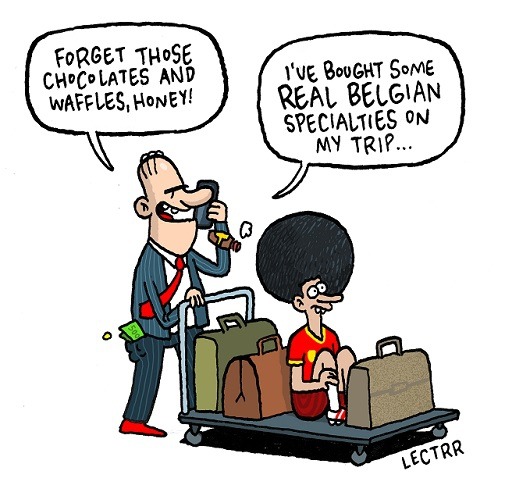They may have tumbled from the number one spot in the world rankings two years ago to seventh place now, but Belgium is still a football superpower. It is a finishing school for some of the world’s greatest players: from Eden Hazard at Chelsea to Youri Tielemans at Monaco, Belgians feature in many of Europe’s biggest teams, and they continue to export their talent in numbers that, say, England can only dream of.
As Belgians consolidate their reputation as the go-to store for cash-filled clubs, there has long been a nagging question about whether this greenhouse effect will eventually pay off at home, for either the national side, or the Belgian domestic scene. That seems to be changing now: the Red Devils have a renewed focus under coach Roberto Martinez, and Belgian clubs are performing better on the European stage, with Anderlecht and Genk both reaching the Europa Cup quarter finals.
A year before the World Cup, and a year after the European Championships, this summer will be relatively quiet for football, with national sides untested. But Belgium can look at the overall trend and sense it is heading in the right direction.
Belgians have been steadily imposing themselves in foreign fields for a while now, as a generation of brilliant young players emerged at the same time. It is largely down to luck. Some players developed in other countries. The Hazard brothers, Eden and Thorgen, were sent to Lille's renowned academy in France. Jan Vertonghen, Mousa Dembélé and Toby Alderweireld of Tottenham Hotspur, Roma’s Vermaelen, and Napoli's Dries Mertens learned much of their trade in the Netherlands. Several of these players were originally at Belgian club Beerschot, which at one stage acted as a feeder club for Ajax and went bankrupt during the summer.
There is also some history. Manchester City’s Vincent Kompany is a product of Belgium's post-colonial immigration having, like Crystal Palace’s Christian Benteke and Everton’s Romelu Lukaku, Congolese roots. Others come from Moroccan families, like Manchester United’s Marouane Fellaini and West Brom’s Nacer Chadli.
But there was some planning too. More than a decade ago, the Belgian football association delivered a blueprint to clubs on player development, which most have followed: it called for better coaching qualifications and, presumably influenced by the Dutch, determined that national sides at all age-groups should play a high-tempo 4-3-3.
It took some time for the results to filter through. The national side, the Red Devils, failed to qualify for Euro 2012, or any major tournament since the 2002 World Cup. But they reached the 2014 World Cup and were unlucky to lose their quarter final against a Lionel Messi-inspired Argentina.
By 2015, a solid run of wins brought Belgium to the number one spot in the FIFA rankings for a few months. Although this is not an exact assessment of footballing strength, it is highly respected, and the Red Devils were universally recognized as a top side. When last year’s Euro 2016 came around, they were considered among the favourites. That they were knocked out by Wales in the quarter finals was attributed less to the innate failings of the side than to the naïve tactics of then-coach Marc Wilmots. Now led by Martinez, formerly of Everton, the players seem more comfortable and confident.
The timing is working out perfectly, too. Hazard, who stands out as the most outstanding individual, is on peak form: the 26-year-old Chelsea star, who was England’s player of the year in 2015, is currently rated by many to be bettered only by Cristiano Ronaldo and Lionel Messi for his mercurial brilliance. Kevin De Bruyne at Manchester City is still just 25: as a dynamic playmaker, his vision and intelligence are matched by incredible energy. Lukaku is just 24, goalkeeper Thibaut Courtois is 25 and Axel Witsel is 28.
All but two of the 25 players in the squad called up for their last match, against Russia in March, actually play in Belgium: Gent’s Thomas Foket and Anderlecht’s Leander Dendoncker, both 22. Most of the others play in England, where the rushed, physical style suits them well: six of the seven top Premier League finishers this year have Belgian players. The ties between England and Belgium have developed into feeder relationships, for example between Manchester United and Antwerp, or Sheffield United and Royal White Star Brussel. In May, last year’s English champions Leicester City bought Belgian Second Division side Oud-Heverlee Leuven (OHL).
This year’s Europa Cup results suggest Belgian teams are improving against their European peers. Even though Anderlecht and Genk failed to reach the semi-finals, they came tantalisingly close in their respective ties against Manchester United and Celta Vigo (Anderlecht pushed eventual winners United into extra time at Old Trafford).
It may be a while before we see the likes of Club Brugge and Genk challenging the Real Madrids and Juventuses in the Champions League, but there are signs that the remarkable surge of Belgian talent in recent years is filtering down to local clubs. And even though the next World Cup, in Russia, is a year away, it’s not too fanciful to suggest that Belgium will be seen as one of the real challengers for the biggest prize of all.
By Leo Cendrowicz

